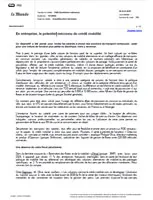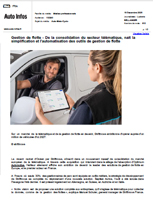Web Media family: PQN (National Newspapers)
Audience: 18129402
Media subject: News-News
Generals April 26, 2025
Number of words: 793
FRA www.lemonde.fr
This system was designed to encourage employees to choose virtuous transport solutions: opt for a smaller or electric company car, or even give it up.
Little by little, the prestige of a beautiful company car is losing its beauty. A cultural barrier that is being released, especially in large cities where alternative mobility solutions and an efficient network of public transport exist. The new generations of employees are happy to switch to electricity, dispose of property and adapt perfectly to sharing solutions. That's right the range of possibilities offered by the mobility credit, unknown, even if it has existed for a few years. The aim of the legislator was to reduce the carbon footprint of the employee, by offering him to benefit from additional transport in soft, shared or public transport in return for an employment credit. It can be used for short or long trips, including personal trips.
Concretely, when an employee is entitled to a certain category of company cars in his company's vehicle allocation policy, if he chooses a model from the lower category and/or switches from a combustion or hybrid model to a 100% electric car, the difference is transformed into a mobility credit. And, if he completely renounces this vehicle, his annual TCO (total cost of ownership) is then taken into account. A sum that can range from 3,000 to 10,000 euros, according to Ayvens (the fleet management and long-term rental subsidiary of the Société Générale group).
This amount can then be used for the use of various types of public or individual transport, from bicycles to taxis and VTCs, naturally via the train, in the form of a subscription or one-off trips, or even a car rental for weekends or holidays, in France or abroad.
The company provides the employee with a payment card for these targeted uses: renting vehicles, carsharing, renting scooters or scooters, buying train or plane tickets. These expenses are indicated as professional or personal depending on the case, and the use of this card allows the fleet manager and HR to monitor consumption in detail.
Decarbonizing employee transport, offering them more flexibility and entering into a virtuous CSR process: on paper, mobility credit therefore has everything to please them. However, it is slow to gain momentum.
“Among our customers, we are seeing interest, but still no concrete action,” explains Philippe Oliva, marketing and product director at Optimum (Shiftmove group), a specialist in fleet management software with 220,000 connected vehicles.
An absence of a penalizing fiscal framework
In the latest version of the “Fleet and Mobility Barometer” by Arval (BNP group) with Ipsos for 2024, it appears that only 11% of French companies questioned as part of the evolution of their mobility policy linked to teleworking have developed alternative mobility solutions or specific packages, and 2% have replaced vehicles in their fleet with monetary allowances. We are a long way off track.
At Optimum, Mr. Oliva remains confident: “Solutions such as mobility credit will develop. The evolution of the market is pushing for this, with the deadline of 2035 [the end of the sale of internal combustion engines], the evolution of mentalities and the constraints of change in fleet management. The first to take the plunge are few at the moment, but businesses are really taking the path of engaging in CSR.”
To encourage its adoption, mobility credit also lacks a real fiscal framework, which, in the meantime, is one of the benefits in kind. However, the latter have become less interesting since February of this year.
This situation is doubly penalizing. On the one hand, it impacts the taxation of the private use of company vehicles (with fuel costs covered by the employer), which increases from 40% to 67%. On the other hand, it does not encourage people to accelerate the transition to mobility credit, which is also affected by tax increases.
It would see its power of attraction amplified if it benefited from a taxation more advantageous, like the sustainable mobility package. For its part, this system concerns all employees (and not only those who have a company vehicle) to accompany them on their commute to work. Enshrined in the mobility orientation law, it is therefore regulated at the legislative level and benefits from a tax exemption of 800 euros per year.








